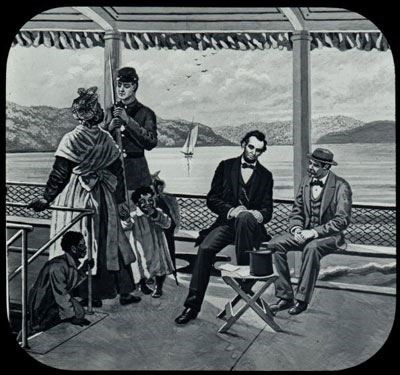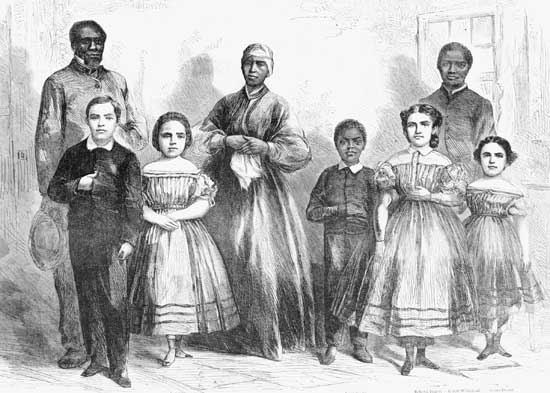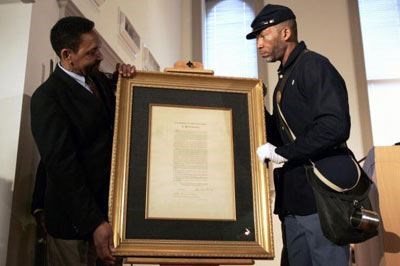 |
| Abraham Lincoln signing the Emancipation Proclamation (www.senate.gov) |
The Emancipation Proclamation
I chose to write about the Emancipation Proclamation because I heard a lot about this document. At first, I thought this was the document that abolished slavery. Later, I understood that the Emancipation Proclamation did not actually free all slaves, but was part of many steps to abolition. In fact, I learned that although President Lincoln wanted to free all slaves in the United States, Lincoln cared more about saving the Union from breaking apart during the Civil War, rather than ensuring an end to slavery. Slavery was abolished years after the Emancipation Proclamation was written after the 13th Amendment, which was written only after the Union's victory in the Civil War. However, through my research, I understood that although the Emancipation Proclamation did not ultimately free all slaves in the United States, it was an important step towards ending slavery. In this paper, I will discuss the related historical context of the Civil War and its relation to the two parts of the Emancipation Proclamation. In addition, I am going to discuss Lincoln's motivation and strategy in using the Emancipation Proclamation to save the Union. Finally, I will discuss the overall result of the Emancipation Proclamation and the positive and negative aspects of the document.
 |
| Lincoln jotting down notes for the first draft (George Eastman House/Getty Images) |
On September 22, 1862, Lincoln issued the first draft of the Emancipation Proclamation, which declared, "that all persons held as slaves within the rebellious states are, and henceforward shall be free." Then on January 1, 1863, Lincoln issued the final version of the Emancipation Proclamation stating specifically which state's slaves were free. "These states included Kentucky, Missouri, Maryland, and Delaware, West Virginia." Accordingly, we see that President Lincoln issued the Emancipation Proclamation in two executive orders. The first order was a draft that simply declared that all slaves from rebellious states were free, whereas the second order named specific states. The specific content of each order of the Emancipation Proclamation was critical to Lincoln's primary motivation of saving the Union, which can be better understood by seeing the Emancipation Proclamation within the larger historical context.
It is important to know the historical context of this time to understand Lincoln's motivation to write the Emancipation Proclamation and to write it the way he did. In 1860, when Lincoln ran for the presidency, one of his main campaign promises was to end slavery. "After Lincoln won, eleven states succeeded from the Union, forming the Confederacy of States." In 1861, as tensions between the Union and the Confederacy increased over the issue of slavery and states versus federal authority, a Civil War began. With the outbreak of the Civil War, President Lincoln saw his nation divided against itself. Lincoln felt strongly that the nation needed to remain united as one. Thus, Lincoln wrote the Emancipation Proclamation as a way to win the war and keep the Union together.
 |
| Emancipation slaves brought to the North after the Civil War ( http://media-2.web.britannica.com) |
The main question is why Lincoln said he wanted to free all slaves, but he wrote the Emancipation Proclamation only for slaves in the rebellious (or confederate) states. Lincoln's reason for writing the Emancipation Proclamation this way was part of his overall strategy to win the war and secure the Union. Actually, Lincoln's main point to free all slaves in the confederate states was winning the Civil War. Lincoln knew that it was not possible for the Confederacy to continue to be strong without slaves because slaves did a majority of the of the manual work in the Confederacy. Through the Emancipation Proclamation, Lincoln freed all slaves in the Confederacy, allowing them the freedom to move to the Union. Lincoln knew that the Confederacy would not have as much strength without their slaves, so by making them weak, the Union would be able to win the war. This was clear in the second order of the Emancipation Proclamation where Lincoln approved freed slaves to be soldiers in the Union army. By doing this, Lincoln not only weakened the Confederacy by taking their slaves, he also strengthened the Union's army because freed slaves had even more motivation to defeat the Confederacy.
So, ultimately, Lincoln used the Emancipation Proclamation as part of his strategy to win the war. When the Union won the Civil War, Lincoln succeeded in saving the Union. And, on December 18, 1865, Lincoln achieved his original campaign goal when William H. Seward announced the adoption of the 13th Amendment to the US Constitution, which declared that all slaves in the whole Union are free. The 13th Amendment was one of the main results of the Union's victory in the Civil War, and because the Emancipation Proclamation was critical to winning the Civil War, it is one of the keys to ending slavery.
 |
| African American Civil War Museum founder and Executive Director Dr. Frank Smith Jr. (left) and Kevin Douglass-Green, great-great-grandson of Fredrick Douglass, position an original copy of the Emancipation Proclamation. (howstuffworks.com) |
From my research, I understood that the Emancipation Proclamation had many positive and negative aspects. For example, Frederick Douglass said "The Emancipation Proclamation was the first step on the part of the nation in its departure from the thralldom of the ages. Although the Emancipation Proclamation did not immediately free any slaves who had not already escaped to the North, it fundamentally transformed the character of the war." The negative side of the Emancipation Proclamation was that the document did not say anything about slaves in the border states. It only freed slaves in rebellious (non-union) states. Only after the end of the Civil War and passing the 13th Amendment did slaves in border states or southern states under Union control become free. So, while it was part of Lincoln's strategy to win the war, it was a big risk for all slaves.
My opinion is that Emancipation Proclamation helped to free slaves in the United States eventually, so even though this document did not free all slaves, I think it was a big step towards their freedom. In conclusion, I believe President Lincoln wrote a very important document called The Emancipation Proclamation. Although many people say he wrote this document to end slavery, the main reason he wrote the Emancipation Proclamation as it stands was a desire to save the Union. The Emancipation Proclamation did not free all slaves. The document that freed all slaves was the 13th Amendment, but it was passed only after the Union won the Civil War. My personal opinion about the Emancipation Proclamation is that even though it was not the main document that freed all slaves, it was a big step towards their freedom because Union could not have won the war without the Emancipation Proclamation.
Page created on 2/2/2009 10:52:55 AM
Last edited 2/2/2009 10:52:55 AM
